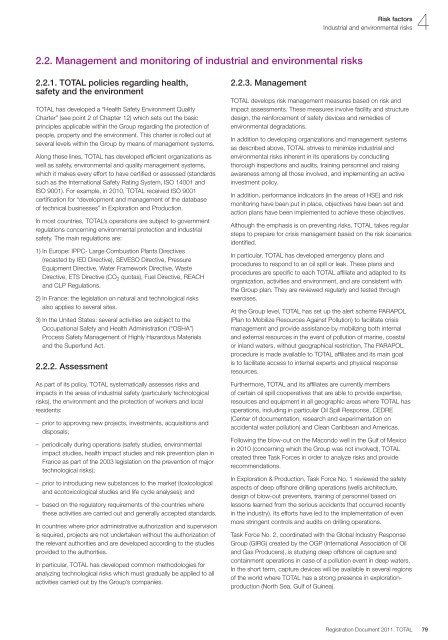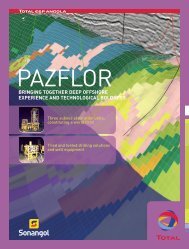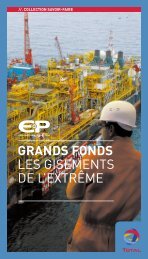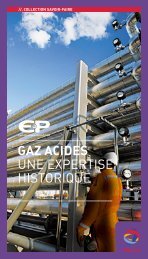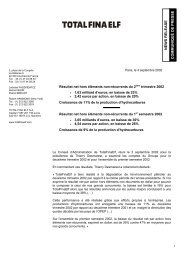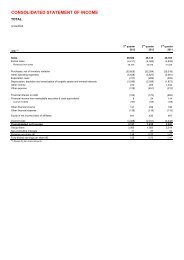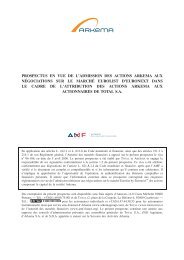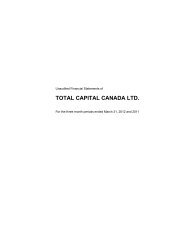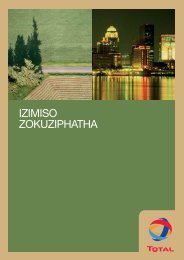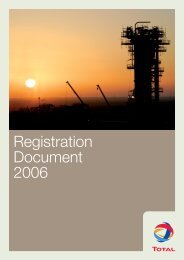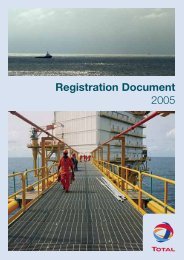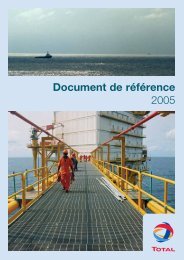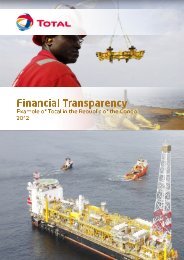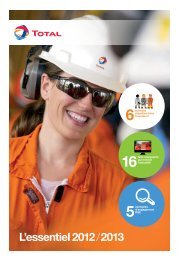Registration document 2011 - tota - Total.com
Registration document 2011 - tota - Total.com
Registration document 2011 - tota - Total.com
Create successful ePaper yourself
Turn your PDF publications into a flip-book with our unique Google optimized e-Paper software.
2.2. Management and monitoring of industrial and environmental risks<br />
2.2.1. TOTAL policies regarding health,<br />
safety and the environment<br />
TOTAL has developed a “Health Safety Environment Quality<br />
Charter” (see point 2 of Chapter 12) which sets out the basic<br />
principles applicable within the Group regarding the protection of<br />
people, property and the environment. This charter is rolled out at<br />
several levels within the Group by means of management systems.<br />
Along these lines, TOTAL has developed efficient organizations as<br />
well as safety, environmental and quality management systems,<br />
which it makes every effort to have certified or assessed (standards<br />
such as the International Safety Rating System, ISO 14001 and<br />
ISO 9001). For example, in 2010, TOTAL received ISO 9001<br />
certification for “development and management of the database<br />
of technical businesses” in Exploration and Production.<br />
In most countries, TOTAL’s operations are subject to government<br />
regulations concerning environmental protection and industrial<br />
safety. The main regulations are:<br />
1) In Europe: IPPC- Large Combustion Plants Directives<br />
(recasted by IED Directive), SEVESO Directive, Pressure<br />
Equipment Directive, Water Framework Directive, Waste<br />
Directive, ETS Directive (CO 2 quotas), Fuel Directive, REACH<br />
and CLP Regulations.<br />
2) In France: the legislation on natural and technological risks<br />
also applies to several sites.<br />
3) In the United States: several activities are subject to the<br />
Occupational Safety and Health Administration (“OSHA”)<br />
Process Safety Management of Highly Hazardous Materials<br />
and the Superfund Act.<br />
2.2.2. Assessment<br />
As part of its policy, TOTAL systematically assesses risks and<br />
impacts in the areas of industrial safety (particularly technological<br />
risks), the environment and the protection of workers and local<br />
residents:<br />
– prior to approving new projects, investments, acquisitions and<br />
disposals;<br />
– periodically during operations (safety studies, environmental<br />
impact studies, health impact studies and risk prevention plan in<br />
France as part of the 2003 legislation on the prevention of major<br />
technological risks);<br />
– prior to introducing new substances to the market (toxicological<br />
and ecotoxicological studies and life cycle analyses); and<br />
– based on the regulatory requirements of the countries where<br />
these activities are carried out and generally accepted standards.<br />
In countries where prior administrative authorization and supervision<br />
is required, projects are not undertaken without the authorization of<br />
the relevant authorities and are developed according to the studies<br />
provided to the authorities.<br />
In particular, TOTAL has developed <strong>com</strong>mon methodologies for<br />
analyzing technological risks which must gradually be applied to all<br />
activities carried out by the Group’s <strong>com</strong>panies.<br />
2.2.3. Management<br />
Risk factors 4<br />
Industrial and environmental risks<br />
TOTAL develops risk management measures based on risk and<br />
impact assessments. These measures involve facility and structure<br />
design, the reinforcement of safety devices and remedies of<br />
environmental degradations.<br />
In addition to developing organizations and management systems<br />
as described above, TOTAL strives to minimize industrial and<br />
environmental risks inherent in its operations by conducting<br />
thorough inspections and audits, training personnel and raising<br />
awareness among all those involved, and implementing an active<br />
investment policy.<br />
In addition, performance indicators (in the areas of HSE) and risk<br />
monitoring have been put in place, objectives have been set and<br />
action plans have been implemented to achieve these objectives.<br />
Although the emphasis is on preventing risks, TOTAL takes regular<br />
steps to prepare for crisis management based on the risk scenarios<br />
identified.<br />
In particular, TOTAL has developed emergency plans and<br />
procedures to respond to an oil spill or leak. These plans and<br />
procedures are specific to each TOTAL affiliate and adapted to its<br />
organization, activities and environment, and are consistent with<br />
the Group plan. They are reviewed regularly and tested through<br />
exercises.<br />
At the Group level, TOTAL has set up the alert scheme PARAPOL<br />
(Plan to Mobilize Resources Against Pollution) to facilitate crisis<br />
management and provide assistance by mobilizing both internal<br />
and external resources in the event of pollution of marine, coastal<br />
or inland waters, without geographical restriction. The PARAPOL<br />
procedure is made available to TOTAL affiliates and its main goal<br />
is to facilitate access to internal experts and physical response<br />
resources.<br />
Furthermore, TOTAL and its affiliates are currently members<br />
of certain oil spill cooperatives that are able to provide expertise,<br />
resources and equipment in all geographic areas where TOTAL has<br />
operations, including in particular Oil Spill Response, CEDRE<br />
(Center of <strong>document</strong>ation, research and experimentation on<br />
accidental water pollution) and Clean Caribbean and Americas.<br />
Following the blow-out on the Macondo well in the Gulf of Mexico<br />
in 2010 (concerning which the Group was not involved), TOTAL<br />
created three Task Forces in order to analyze risks and provide<br />
re<strong>com</strong>mendations.<br />
In Exploration & Production, Task Force No. 1 reviewed the safety<br />
aspects of deep offshore drilling operations (wells architecture,<br />
design of blow-out preventers, training of personnel based on<br />
lessons learned from the serious accidents that occurred recently<br />
in the industry). Its efforts have led to the implementation of even<br />
more stringent controls and audits on drilling operations.<br />
Task Force No. 2, coordinated with the Global Industry Response<br />
Group (GIRG) created by the OGP (International Association of Oil<br />
and Gas Producers), is studying deep offshore oil capture and<br />
containment operations in case of a pollution event in deep waters.<br />
In the short term, capture devices will be available in several regions<br />
of the world where TOTAL has a strong presence in explorationproduction<br />
(North Sea, Gulf of Guinea).<br />
<strong>Registration</strong> Document <strong>2011</strong>. TOTAL 79


